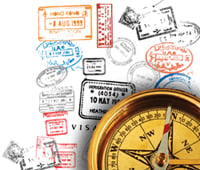Taking a Break

Photo illustration: iStockPhoto.com
Christopher Manning, a partner in a small Washington, D.C., firm, knows the importance of being accessible to his clients. But he also likes his vacations.
“The necessity of relaxation doesn’t change based upon the economic climate,” says Manning, a principal at Manning Sossamon. “The only difference may be how lavish that retreat is.”
Manning is not alone. Many lawyers in small and solo firms insist upon a little recreation, despite the recession. Here are some of their rules for going on the road:
• Stay connected. Always bring your laptop, BlackBerry and cell phone, and make sure you have Internet access. Make sure you have the technology you need to write that emergency court filing or review that important memo. Also, make sure you can quickly respond to any message left by a client via secretary, voice mail or answering service. At the very least, ensure that you can return a call by the end of the day.
“People don’t care if they can’t get ahold of you right away, as long as they know they will hear from you reasonably soon,” says Ed Poll, a law firm consultant in Venice, Calif.
• Buddy system. Always make sure that you have another lawyer who can handle your cases while you’re gone. Lawyers in small firms say they coordinate schedules so there’s always one attorney left behind to manage the caseload. And once you have found your temporary replacement, don’t micromanage from afar.
“Make sure the lawyer handling your cases is someone you trust and knows your clients,” says Anthony Rao, managing partner in the New York City office of Rao Ongaro Burtt & Tiliakos. “You have to be able to let go,” he says. “Otherwise you will spend a substantial amount of time reviewing discovery requests and day-to-day counseling.”
Poll says solos should have an arrangement with at least one other attorney in the area who can back them up.
• Helping hands. A well-trained support staff can also ensure that the business doesn’t fall apart while you’re gone. Make sure all staffers know what they are expected to do while you are on vacation—and that they are capable of handling any increase in workload.
“You have to have reliable staff that will handle everything appropriately and contact you if something urgent pops up,” says Amy Tirre, a solo practitioner in Reno, Nev., who takes one week of vacation every quarter. “Leave staff in charge who understand the difference between what a client thinks is urgent and what is actually urgent.”
• Have fun, but not too much. Despite the economy, taking a vacation sends a positive message to clients and colleagues. “By taking a vacation, you are actually assuring people that life is proceeding normally,” Tirre says. “It’s a signal you are successful, and clients respect that.”
However, some lawyers suggest shortening the amount of time you are gone to no more than a week.
It’s important to take a vacation short enough that you don’t lose track of the daily happenings at your firm, but long enough to help you relax, Manning says.
And finally, once you have decided to go on vacation, banish any worries or remorse.
“Enjoy your vacation,” says Poll. “The whole point is to come back refreshed. If you can’t do that, why take the vacation?”



